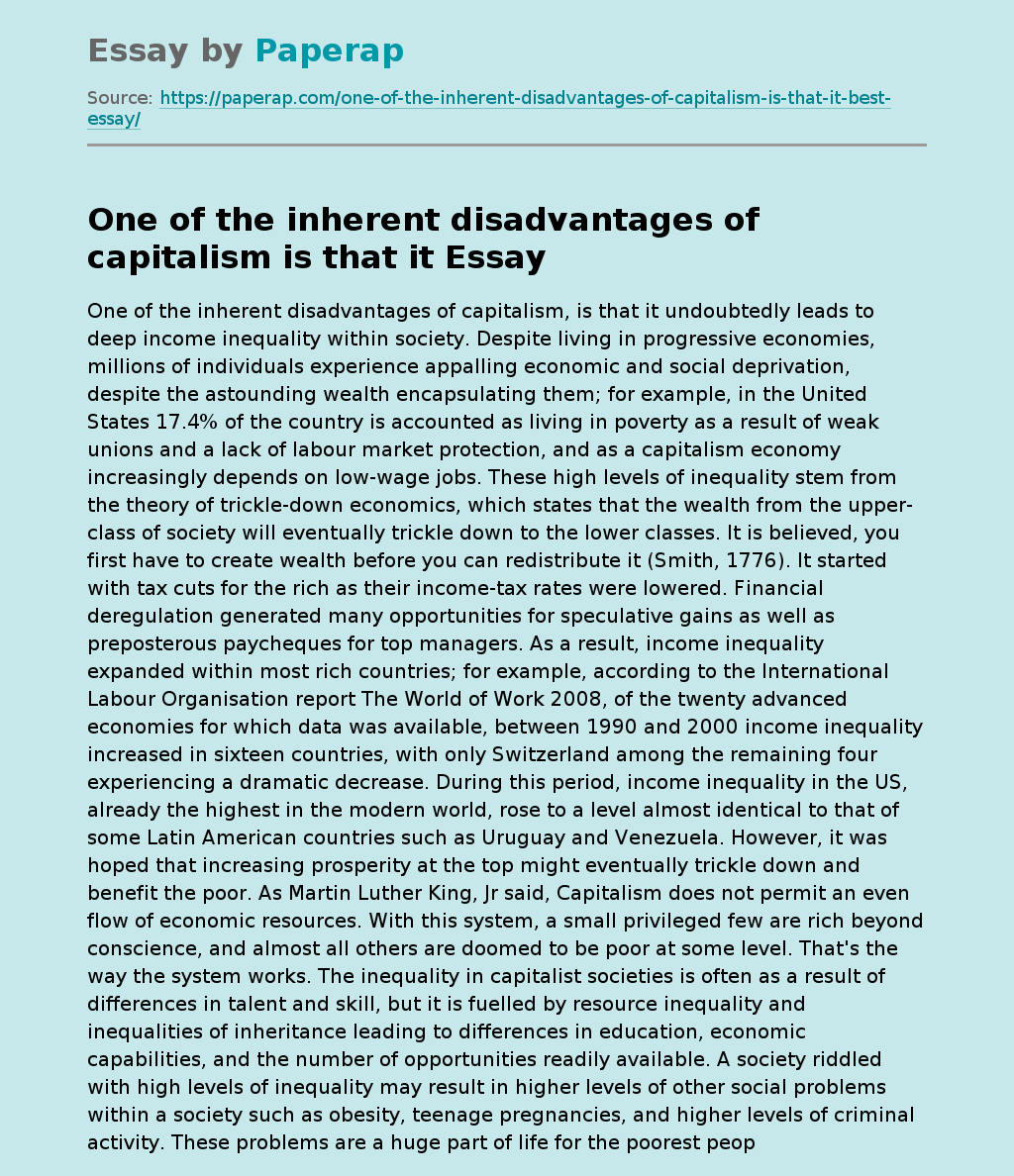One of the inherent disadvantages of capitalism is that it
One of the inherent disadvantages of capitalism, is that it undoubtedly leads to deep income inequality within society. Despite living in progressive economies, millions of individuals experience appalling economic and social deprivation, despite the astounding wealth encapsulating them; for example, in the United States 17.4% of the country is accounted as living in poverty as a result of weak unions and a lack of labour market protection, and as a capitalism economy increasingly depends on low-wage jobs. These high levels of inequality stem from the theory of trickle-down economics, which states that the wealth from the upper-class of society will eventually trickle down to the lower classes.
It is believed, you first have to create wealth before you can redistribute it (Smith, 1776). It started with tax cuts for the rich as their income-tax rates were lowered. Financial deregulation generated many opportunities for speculative gains as well as preposterous paycheques for top managers. As a result, income inequality expanded within most rich countries; for example, according to the International Labour Organisation report The World of Work 2008, of the twenty advanced economies for which data was available, between 1990 and 2000 income inequality increased in sixteen countries, with only Switzerland among the remaining four experiencing a dramatic decrease.
During this period, income inequality in the US, already the highest in the modern world, rose to a level almost identical to that of some Latin American countries such as Uruguay and Venezuela. However, it was hoped that increasing prosperity at the top might eventually trickle down and benefit the poor.
As Martin Luther King, Jr said, Capitalism does not permit an even flow of economic resources. With this system, a small privileged few are rich beyond conscience, and almost all others are doomed to be poor at some level. That’s the way the system works. The inequality in capitalist societies is often as a result of differences in talent and skill, but it is fuelled by resource inequality and inequalities of inheritance leading to differences in education, economic capabilities, and the number of opportunities readily available. A society riddled with high levels of inequality may result in higher levels of other social problems within a society such as obesity, teenage pregnancies, and higher levels of criminal activity. These problems are a huge part of life for the poorest people in underdeveloped societies. In addition, greater income equality may encourage social harmony by reducing industrial strikes and crime, which may in turn encourage investment, as it reduces the danger of disruption to the production process and thus to the process of generating wealth. Therefore, simply making the rich richer does not benefit the rest of society. If the trickle-down theory is going to benefit the rest of society, the rich must be made to deliver higher investment and thus higher growth through policy measures and then share the rewards of such growth through a mechanism such as the welfare state.
The capitalist industrialisation that is dominating the world, has all been at the cost of the environment. Over the years, American corporation, Archer-Daniels Midlands (ADM) one of the worlds largest agricultural processors and provider of food ingredients, has been centre of negative press regarding their responsibility at releasing 255,000 pounds of cancer-causing pollutants into the atmosphere. On April 9, 2003 a landmark Clean Air Act was announced by the Department of Justice and the Environmental Protection Agency aimed at implementing huge environmental improvements nationwide that was aimed at reducing 63,000 tons of air pollution a year. Residents of the local surrounding area complained of respiratory problems as well as bronchitis and pulmonary edema, which can deteriorate the kidneys and immune system. This example of pollution, comes as a result of the capitalist society in which deregulation has allowed ADM to essentially function as they please and freely pollute the environment. Since then, ADM has vowed to implement sustainable operations into their business, as stated in their 2017 Sustainability Report sustainable practices and a focus on environmental responsibility are integral to the work we do every day as our business grows and evolves, so has our commitment to sustainability. That is why we have set ambitious sustainability goals for ourselves. The relationship between the economy and the environment since the beginning of capitalism has never been good as capitalist businesses only want to achieve one thing profit. To achieve this they will freely pollute the environment via contaminating rivers and use non-renewable resources in an attempt to simply lower wastage costs and save a few pounds. Linking into the point that capitalism leads to great inequality within all aspects of life, most importantly typically negatively affecting the poor, 7 million people mostly in developing nations die every year from the dirty air they breathe. This is because, most capitalist corporations tend to set up operations in developing countries, where wages and rates are far less expensive and there are fewer regulations than in western nations. Across the globe, diseases provoked by pollution were guilty for an estimated 9 million premature deaths in 2015”16% of all deaths worldwidethree times more deaths than from AIDS, tuberculosis, and malaria combined and 15 times more than from all wars (Stockholm Resilience Centre, 2015). “It is of critical importance to recognise that pollution is the largest environmental cause of disease and premature death in the world today, widely exceeding the number of deaths from war, violence, AIDS, tuberculosis and malaria, combined,” (Rockstr?m, 2016). Therefore, capitalism is at the forefront of the pollution problem due to increasing industrialisation not only of the western world but now in poorer or developing countries. Capitalism, as a result, is liable for 9 million premature deaths in 2015, more than any war there ever was, leaving us to question how can this society be justified.
One of the inherent disadvantages of capitalism is that it. (2019, Nov 23). Retrieved from https://paperap.com/one-of-the-inherent-disadvantages-of-capitalism-is-that-it-best-essay/

